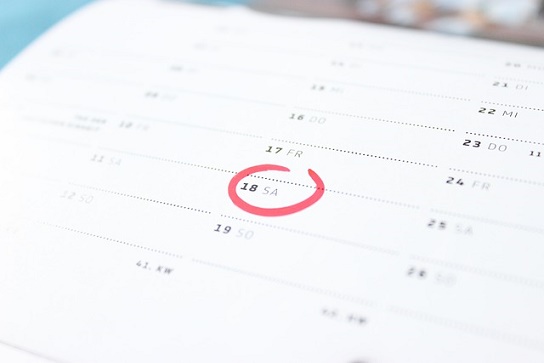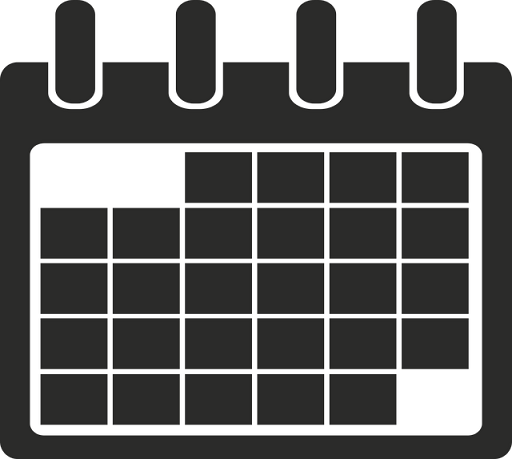
There are a lot of GRE test dates every year, which is great for giving you options, but it can make choosing the best test date a challenge. When should you take the GRE? How long does it take for schools to receive your scores? How long will you need to study?
Keep reading to learn the answers to all these questions and more.
What to Know About the GRE Before You Get Started
There are a couple pieces of information you should make sure you know before you start looking at exam dates. First, almost everyone who takes the GRE does so on the computer. You can only take the GRE on paper if there are no computer-based testing centers near you. (You can search for nearby test centers on the ETS website.)
Because the GRE uses computer-based testing, there are many test dates available, and you can take the GRE most days of the year, although some test centers don’t offer the GRE on certain days of the week.
The total test time for the GRE is 3 hours and 45 minutes. This does not include breaks or the time it takes to fill out paperwork when you arrive at the test center, so test slots are 4.5 hours long to accommodate for this extra time. For most test centers, the GRE is offered at two different times during the day: once in the morning and once in the afternoon.
Additionally, your GRE scores will be valid for five years after you take the test, so it is possible to take the GRE several years before you plan on applying to grad school.
Quick side note: we've created the world's leading online GRE prep program that adapts to you and your strengths and weaknesses. Not sure what to study? Confused by how to improve your score? We give you minute by minute guide.
You don't NEED a prep program to get a great GRE score. But we believe PrepScholar is the best GRE prep program available right now, especially if you find it hard to organize your study schedule and don't know what to study.
Click here to learn how you can improve your GRE score by 7 points, guaranteed.
How to Figure Out When to Take the GRE
The most important information you need to determine your GRE schedule is when scores must be received for each of the schools you’re applying to. These deadlines are often in the late fall or early winter, but be sure to find out the exact date for each of your schools. Also, the deadline your GRE scores need to be received by may or may not be the date your application needs to be submitted. Make sure you find the correct date.
Find the earliest deadline among all your schools, and star it, circle it, write it in giant letters on a piece of paper, whatever you have to do to pay attention to it. This is the date when your scores absolutely need to be received. If you’re not sure which schools you want to apply to, use November 15th as your deadline. This is an early enough date that you’ll be within the deadline for the vast majority of schools.
Once you have that date, work backwards to figure out when to take the GRE. Below are two methods for figuring out when to take the GRE. The first is a simple method to get a relative test date. The second method is more involved and will give you exact dates for when to take the GRE and begin studying.
The Quick Method for When to Take GRE
The fast and easy method for figuring out when you need to take the GRE is to give yourself 2-3 months of preparation time before you take the GRE for the first time. This will give most people enough time to adequately prepare for the test.
If you want to leave room for retakes, add one month for each retake (two retakes is usually enough). You need to wait at least 21 days between each GRE you take, and leaving a month between tests gives you enough time to figure out the mistakes you made and how to avoid them.
Also, make sure you take the GRE at least three weeks before school deadlines so you’ll be sure schools receive your scores in time.
So all included, take your first GRE 3-4 months before your school deadlines, and start studying 2-3 months before that. That’s your simple answer to when to take the GRE.
The In-Depth Method for When to Take GRE
Want a more detailed answer to the question, “when should I take the GRE?”
Follow these five steps to get the exact dates for when you should begin studying, take the GRE for the first time, and complete any possible retakes.
#1: Leave Time for Schools to Receive Your Scores
It takes time for your scores to be sent to schools, so you have to account for that. If you choose which schools to send your scores to while you’re still in the test center, immediately after your complete the GRE and view your unofficial Verbal and Quantitative scores, your scores will be received by schools 10-15 days after you take the test. You’ll receive an email telling you that your officials scores can be viewed on your My GRE account, and this is also when the schools you indicated will receive your scores.
So, to be on the safe side, find the date three weeks before your earliest application deadline. This is the absolute last day you should take the GRE in order for schools to receive your scores in time.

#2: Figure Out How Much You Need to Improve
The biggest factor in deciding when to take the GRE is how much you want to improve your score. To do this, you need to set goal scores and get a baseline of how we’ll you’re currently doing. We go over this process in more detail in our guide, What’s a Good GRE Score?, but here’s the process briefly:
First, you should research the average scores of each of the schools you’re interested in. Then, find the highest scores for both the Verbal and Quantitative sections. Add two points to each of these scores to get your score goals. This will ensure that, if you meet your goals, you’ll be safely within your most competitive school’s GRE acceptance range.
Next, if you haven’t already done so, take and score a practice GRE. (ETS has software you can download to take two official practice GREs.) The difference between your practice test scores and your goal scores is how much you need to improve.
Below are estimates of approximately how many hours you need to study in order to raise your GRE score by a certain number of points.
- 5 points, 40 hours
- 10 points, 80 hours
- 20 points, 160 hours
- 30 points, 240 hours
These numbers indicate how much you need to study to raise your GRE score by that many points across BOTH Verbal and Quantitative sections. So, in 40 hours, you could raise your score for each section by about 2.5 points (5 points total).
These are VERY rough estimates, depending on your personal situation. If you’re new to the GRE, are studying intelligently, or using a top-of-the-line GRE prep program, you can probably make more progress in less time.
If you’ve already studied 100+ hours for the GRE, are a slower learner, or are using bad GRE prep materials, then you’ll make less progress over time.
If you’re looking to improve your score more than 40 points, know that it will probably be difficult and take a lot of time. The GRE tests knowledge you learned from over a decade of school, and it’s hard to build up the content and skills you need to raise your score by 40 or more points. If you are hoping to make large improvements in your GRE score, you may want to look into hiring a tutor to help with your studying.
Check out our guide for a more in-depth look at how long you should study for the GRE.
#3: Decide How Much You Can Study Each Week
Now that you know how many total hours you need to study, it’s time to figure out how many hours you can study a week.
Be realistic when deciding this. It’s better to spread your studying out than to try and cram in a bunch of hours over a short period of time. Cramming can cause you to stay up all night studying without retaining much information or lead you to give up because your study schedule is too demanding. If it’s summer and you don’t have work or school to worry about, you could potentially get in 40 hours of studying a week. However, if you already have a lot going on, 5-10 hours of studying a week may be more realistic.
#4: Include Time for Retakes
You also want to play it safe and make sure you have enough time to retake the GRE if you’re not happy with your first score.
Leave time for two retakes. This is enough for most people to reach or get close to their goal scores if they’ve been studying effectively. You can only take the GRE once every 21 days but, to ensure you have enough time to study, schedule four weeks between each potential retake. So, for two retakes, you’ll add eight weeks to your schedule.
It’s completely possible that you won’t need both or either of these retakes. In that case, you would just have your GRE completed well before your deadline, which is great. Also, be aware that you can only take the GRE five times within a 12-month period, so there’s a limit to the numbers of retakes you can do.
#5: Put It All Together
Now it’s time to figure out the magic date when you should take the GRE. First, divide the number of hours you need to study (from step 3) by the number of hours you expect to study a week (from step 4). That’s how many weeks you need to study to be ready to take the GRE.
Next, add eight weeks to that number to account for two possible retakes. You’ll now have the total number of weeks you need to prepare for the GRE as well as retakes.
Want to improve your GRE score by 7 points? We have the industry's leading GRE prep program. Built by world-class instructors with 99th percentile GRE scores, the program learns your strengths and weaknesses through machine learning data science, then customizes your prep program to you so you get the most effective prep possible.
Try our 5-day full access trial for free:
Now, take the date you found from step 1 (the date that takes into account the time required for schools to receive scores), and count back from that date the number of weeks you just calculated.
What date did you land on? That’s when you should begin studying for the GRE.

Deciding When to Take the GRE: 2 Examples
Let’s look at two examples to see how these numbers look with real data.
Eleanor: Extensive Prep Plan
First is Eleanor. Here’s the criteria Eleanor wants to meet:
- She needs to have her scores reported by December 1st.
- She wants to improve her GRE score by 20 points, which means she’ll need about 160 hours of studying.
- She’ll be able to study 20 hours a week.
- She wants to leave time for two retakes.
First, if Eleanor’s earliest deadline is December 1, she’ll want to take the GRE at least three weeks before that to ensure her scores are received in time. That means November 10th is the last day for her to take the GRE. Next, by dividing 160 by 20, Eleanor sees that she needs eight weeks to get her studying in.
Those eight weeks, combined with two months for her retakes, puts her at a total of 16 weeks from the time she begins studying to when she’ll have taken her 3rd GRE (if she chooses to do both retakes).
Counting back 16 weeks from November 10th means that she needs to begin her studying on July 21st. Her first exam date will come eight weeks later, on September 15th, and if she chooses to do retakes, she should schedule them around October 13th and November 10th.
James: Condensed Prep Plan
James also wants to take the GRE, but he doesn’t have a lot of time to devote towards studying, and he isn’t planning on retaking the exam. Here’s his info:
- He needs to have his scores reported by January 10th.
- He wants to improve his scores by 10 points, so he’ll need to study 80 hours.
- James will be able to study 15 hours a week.
- He’s not planning on any retakes.
Just as in Eleanor’s situation, James should first count back three weeks from his earliest application deadline to account for the time needed for schools to receive scores. This date is December 20th, which is the last date he can take the GRE.
Then, by dividing 80 by 15, he sees that it will take a little more than five weeks to complete his studying, so he rounds that up to six weeks in order to be safe. Since James isn’t going to do any retakes, he just needs to count back six weeks from December 20th, which is November 15th.
James should begin studying for the GRE on November 15th and have the test taken by December 20th.
Remember, the dates you come up with are the last days you should do each of these things. If you have the time and want to get things done early, you can always set your test dates earlier and move your study start date forward accordingly.
What If You Have Lots of Time to Take the GRE?
If your deadline to submit GRE scores is more than six months away, then you have a lot of time to prepare and plan out when you want to take the exam.
Since you have a lot of flexibility for when to take the GRE, try to plan it around a period when you have more time to devote to studying. If you’re currently in school, you may want to take the GRE over the summer when you’re likely not in class. Many people planning on attending grad school immediately after undergrad take the GRE the summer after their junior year, when they’re not in class and still have plenty of time for retakes. (Check the dates you’re interested in early though, since some test centers have limited test dates in June and July.)

Which Day Should You Take the GRE?
Once you have it narrowed down to the week or month you’re going to take the GRE, it’s time to choose the specific date and time to take the exam. When can you take the GRE? As mentioned above, the GRE is offered nearly every day, in both the morning and afternoon.
When choosing which day to take the GRE, make sure to pick a date that works well with your schedule. You don’t want to choose a day when you have an important meeting, a family party to go to later, or a tough class you have to miss because that can distract you while you’re taking the test. Try to choose a day when you’ll have plenty of time to take the exam (remember, it’ll take about 4.5 hours). It’s a bonus if you’ll also have time to relax and take a break after you’re finished with the test.
Many people choose to take the GRE on a weekend because it helps avoid conflicts with school and/or work, but be aware that weekend test dates tend to fill up earlier than weekday dates, so be sure to register at least several weeks ahead of time.
For most people, a morning test time will work better because they can get up and take the GRE right away without spending the day worrying about it, and, when it’s over, they have the rest of the day free. However, it’s possible that the afternoon slot will work better for you, for example, if it fits better in your schedule or you think you’ll get a better score if you can sleep in and take the test more refreshed.
The bottom line is to think about your schedule and personal preferences before choosing the exact test date and time.
3 Final Tips for When to Take the GRE
Keep these tips in mind as you decide when to take the GRE and begin your preparation for the exam.
Keep Track of Deadlines
Put each school deadline in your calendar so you can stay aware of your schedule and not let any deadlines slip past you. It can also help to write out your study schedule and the progress you hope to complete each week in order to stay on track with your studying.
Register Early
You can register up to two days before your exam, but it’s to your benefit to register early.
Once you’ve decided on a test date and location, complete the registration process, even if the exam itself is a few weeks or months away. Registering sooner rather than later will help ensure you get a spot, and knowing that you’re officially registered to take the GRE on a specific date can help encourage you to stick to your study schedule.
Want to improve your GRE score by 7+ points?
Check out our best-in-class online GRE prep program. We guarantee your money back if you don't improve your GRE score by 7 points or more.
PrepScholar GRE is entirely online, and it customizes your prep program to your strengths and weaknesses. We also feature 2,000 practice questions, official practice tests, 150 hours of interactive lessons, and 1-on-1 scoring and feedback on your AWA essays.
Check out our 5-day free trial now:
Know How Rescheduling Works
As you prepare for the GRE, be sure to take regular practice tests to track your progress and estimate your scores for the real test. If your test date is approaching quickly and you’re still far from your goal scores, it is possible to reschedule your exam date.
The rescheduling fee is $50, and you have to reschedule at least four days before your exam date or your test fee will be forfeited. If you do decide to reschedule, make sure you still have enough time for your scores to be sent in time for school deadlines. Also, come up with a study plan that you can stick to that will help you see the results you’re looking for.
Final Verdict: When Should You Take the GRE?
It’s important to plan when you’re going to take the GRE to make sure your scores are received in time and you have enough time to prepare and possibly retake the exam. Most people need about 2-4 months between the time they begin studying for the GRE and their application deadlines. You’ll have to take the GRE at least three weeks before your earliest application deadline in order for there to be enough time for schools to get your scores.
The number of weeks you’ll need to study will be based on both how many points you want to improve your score and how many hours you can study each week. If you want to account for possible retakes, plan on leaving at least a month for each retake so that you have enough time to study and improve your score.
What’s Next?
Want more information on the GRE? Check out our guide to everything you need to know about the GRE, including how long it is, what it covers, and how you should prepare.
Once you’ve decided when to take the GRE, how do you register for the exam? Read our step-by-step guide to GRE registration for everything you need to know.
What’s a good GRE score? Learn which score you should be aiming for based on the schools you’re looking at.
Ready to improve your GRE score by 7 points?
We've written a eBook about the top 5 strategies you must be using to have a shot at improving your GRE score.
Download it for free now:

